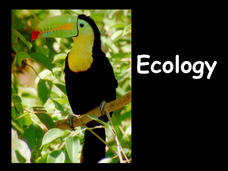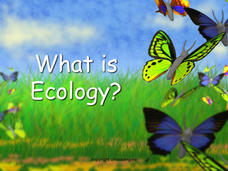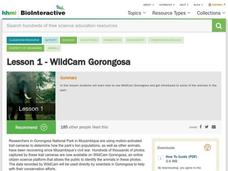Virginia Department of Education
A Designed Organism
How can you encourage pupils to demonstrate creativity while still meeting the objective of applying technical knowledge? This activity is your answer! Scientists will create an imaginary creature and prepare a graphic organizer with...
Scholastic
Study Jams! Biomes
Do you know the difference between a biome and an ecosystem? Teach elementary ecologists exactly what a biome is with this captivating cartoon! It discusses six biomes: taiga, tundra, deciduous forest, desert, tropical rainforest, and...
Curated OER
Regents High School Examination: Living Environment 2003
The living environment, from the interior of a cell to the complex relationships among populations, are queried in this final examination. Learners look at air pollution maps, diagrams of cells, population graphs, and drawing of cells....
Curated OER
Regents High School Examination: Living Environment 2005
The 2005 version of the Regents High School Examination in the area of ecology is as comprehensive as previous years' exams. It consists of 40 multiple choice questions on everything from the structure of DNA to the interactions within...
Curated OER
Regents High School Exam: Living Environment 2008
Tne New York Regents High School Examinations are comprehensive and include various styles of questions, includingmultiple choice and the analysis of graphs. This particular version, the 2008 Living Environment exam surveys a variety of...
Purdue University
Mammals and Ecosystems
Mammals have unique interactions with their ecosystems. Using a multi-part lesson, learners research local mammals using recommended websites and use their findings to create their own paper ecosystems including appropriate mammals. They...
Pace University
Grades 6-8 Ecology
Why are our national parks important? Scholars research the national parks and explore the basic ecology of these areas in a differentiated instruction unit on ecology. They learn about ecosystems, food chains, symbiosis, and biomes. The...
Biology Junction
Ecology
Psychologists study human relationships while ecologist study relationships between organisms in the environment. An introduction to ecology and the related vocabulary benefits scholars as they progress through the presentation and...
Biology Junction
Energy Flow in an Ecosystem
Every living thing requires a food source, thus the interconnections in ecosystems become complex. Scholars learn about these interconnections in a presentation on energy flow. It starts with the sun and moves through many different...
Biology Junction
What Is Ecology?
Do you know the name for the biological study of interactions? A short presentation with accompanying worksheet introduces individuals to ecology. The materials offer a broad overview of the subject and the levels of organization to...
Howard Hughes Medical Institute
Lesson 1: WildCam Gorongosa
Take a walk on the wild side! Episode one of an eight-part series of interactive lessons regarding Gorongosa National Park invites learners to become a part of the citizen science community. Scholars read a brief overview of the trail...
Howard Hughes Medical Institute
Niche Partitioning and DNA Metabarcoding
What is DNA metabarcoding? Show your biology class the latest method for studying biodiversity in an ecosystem with a fun, informative interactive. Individuals examine the animal species that compete for vegetation, then learn how their...
Howard Hughes Medical Institute
Measuring Biodiversity in Gorongosa
Take your biology class' understanding of biodiversity to a whole new level! Ecology scholars use data to calculate three different diversity indices based on the organisms in the Gorongosa National Park. The four-part activity uses an...
Howard Hughes Medical Institute
Niche Partitioning Activity
Dinnertime on the African savanna is a highly choreographed event! Introduce young ecologists to the concept of niche partitioning through a hands-on activity. Pupils research animal behaviors and use data to develop an understanding of...
University of Southern California
Mastering Microbes
Small but mighty! Learners explore the role of microbes in a healthy ecosystem. An engaging lesson asks pupils to design an aquaponics system that demonstrates that healthy microbes are necessary to maintain the ecosystem.
It's About Time
Mass Extinction and Fossil Records
The focus of a fossil-based lesson uses graphs and charts that allow young paleontologists to make inferences about events of mass extinction. They must apply their previous knowledge about fossil records in this final lesson of the...
Curated OER
Adaptations to Niches and Habitats
Life science learners measure and record traits of seeds, leaves, and their own hands and then graph the data to find a continous distribution curve. They compare and color diagrams of seven different animals' forelimbs (not included),...
Curated OER
Raven Chapter 54 Guided Notes: Community Ecology
Providing a sweeping overview of population and community interactions, this ecology worksheet gets learners thinking. They differentiate between habitat and niche, describe and give exemplars of various animal and plant defenses,...
Curated OER
Exploring Arizona's Biotic Communities Lesson 2: Biotic Communities Vocabulary
Part of a unit on Arizona's biotic communities, this lesson focuses on the vocabulary to be used. Terms include biodiversity, topography, desert, hybridization, niche, and more! Youngsters will define these words from contextual...
Curated OER
Community Ecology
Chart ecological community interactions and answer questions about niche, defenses, trophic structure, and succession. This community ecology worksheet provides a general overview of the interactions that occur among organisms that share...
Curated OER
Cycling of Matter and Energy
These twenty various types of questions related to the cycling of matter and energy require students to match each definition in column 1 with the correct vocabulary term from column 2. Then, students explain what is being demonstrated...
Curated OER
Living Environment
In this environment lesson young scholars complete a series of multiple choice and short answer questions on the food chain, DNA, cellular reproduction.
Curated OER
Big Cats
Students study what a niche is and its role in a community. In this cats instructional activity students research the Internet for information on big cat species.
Curated OER
Niches and Adaptations
Students present information about a species, its niche, and adaptations. In this lesson on animal environments, students explore how surroundings can affect a given population resulting in adaptation.

























